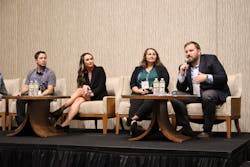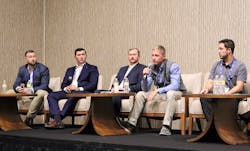How to engage ‘next-gen’ workers in a legacy industry
Melanie Landry is a millennial who isn’t resigned to a Great Resignation.
After the 30-year-old environmental manager’s eldest son was diagnosed with autism, International-Matex Tank Terminals (IMTT) approved a more flexible, “hybrid” schedule that made it possible for her to keep working while also caring for her son—and secured her loyalty to the bulk liquid storage company.
“IMTT took the time to allow me to get my son the therapy he needed, and that job flexibility is what kept me around,” she said during a recent panel discussion on engaging the next generation in the terminal industry during the International Liquid Terminals Association’s 2022 International Operating Conference.
“I’m forever grateful to IMTT for that.”
Work-life balance is a growing concern for employees around the world. After two years of remote work, 47% of respondents in Microsoft’s 2022 Work Trend report said they are more likely to put family and personal life over work than before the COVID-19 pandemic, and that’s especially true for younger generations. Fifty-five percent of millennials said they’re more likely to prioritize health and well-being over work.
By allowing Landry to prioritize her son’s health, IMTT retained a rising star.
See also: Finding and retaining technicians: Understanding the supply and demand
That’s why reluctant Gen X and baby boomer bosses need to embrace flexible scheduling, which is increasingly important to the under-35 crowd, Landry argues. Because while 54% of leaders fear productivity was negatively impacted by the shift, according to the report, more than 80% of their employees—including Landry—insist they’re equally as productive; and managers need their services to remain competitive in a tight labor market as badly as many families need two incomes to survive soaring inflation.
Remote work was one of several hot topics covered by the eight-millennial panel led by Chris O’Neil, managing director at Sprague. They also discussed attracting and retaining “next-gen” workers, the value of mentors, and compensation’s shifting role in job satisfaction, providing valuable insights for terminal managers, leaders in adjacent industries—or anyone else trying to build a business in a post-pandemic world.Attracting next-gen workers
Landry learned about IMTT through its community outreach efforts while growing up near the company’s St. Rose, Louisiana, facility. She knew who they were but little about what they did, so she jumped at the opportunity to intern there—and never left. Ten years later, she’s paying forward her positive first impressions. “We operate because communities allow us to do so, so it’s important to be a great neighbor and work with them through outreach events, volunteering, and sponsoring educational programs,” she said. “I host a lot of students who are interested in the engineering field, and let them do ‘job shadows’ with me.”
Matt LaBorde, a project manager with TC Energy’s U.S. Liquid Products division, indicated industry leaders must highlight the progress they’ve made in environment, health, and safety, since the early days of “rolling coal” in the 1980s, to appeal to younger employees; and stress the impact they can have on a still-vital industry going forward. “Those initiatives have helped us with hiring younger workers,” LaBorde said. Caitlin Geisinger, a business development manager with Burns & McDonnell, concurred, saying “zoomers” want to “feel good” about their work, so hiring managers should emphasize the difference they can make in a critical sector. “My generation and the one below me want to make the world a greener, better place, so focus on the role the terminal industry plays, from renewable fuels to ammonia, hydrogen, and carbon capture—because we’re going to be a huge part of that.”
Paul Ramsey said Oiltanking—which recently carved out a business focused on storing sustainable liquids—found success competing for younger workers by highlighting their benefits, and establishing apprenticeships and educational programs. “We’ve been able to help the community, through outreach, and courses for younger folks who want to enter this business, and attract them that way,” he said.
Retaining under-35s
Appealing to Zoomers and Millennials is only the first step. Keeping them around can be trickier. Microsoft’s survey suggests 52% of Gen Zers and millennials are likely to consider changing employers this year, up 3% year-over-year—and why shouldn’t they? The majority of people switching jobs are seeing it pay off in higher earnings, according to a new Pew Research Center analysis of U.S. government data.
Burns & McDonnell has a “shadow group” program for high-performing millennials and zoomers, Geisinger said. They meet once a month to dive into different aspects of the business, including operations, finances, and HR policies, helping broaden their overall understanding of industry challenges and opportunities. And the chance to apply that knowledge in different roles within the company keeps her engaged, she added.
Project manager Gabriel Lopez said Kinder Morgan provided a career “roadmap” when he onboarded that showed where he was, where he could be, and what he needed to do to get there. “That’s my motivation to keep going on the tough days because I know there are good things ahead,” he attested. “I know I’m going to get somewhere.” Lopez said leadership also made him feel like a key member of the team by explaining the importance of his position. “That gave me a sense that I’m not doing this job for a salary or paycheck,” he said. “I’m contributing to the team, and if I keep it up, I’ll be given more responsibility.”
It’s also up to management to set realistic expectations for employees accustomed to receiving “instant gratification” via smartphones and social media, and want the next promotion now, whether they’re truly ready or not, LaBorde allowed. “Hear us out, and see that we are hard working,” he said. “We want to be doing something … but how do we go about it? Do we need more training, or do we need a mentor? Should we be taking more courses, or studying under a subject-matter expert who has that knowledge?”
Managers shouldn’t, however, believe all the hype about millennials, Deutsch cautioned. While opportunities available to modern workers may be different, he isn’t convinced employees’ desires have changed that much in the last 75 years. Younger generations "want fair compensation, and they want to have flexibility to be able to raise a family and pursue their interests,” he said. “But at the same time they still want stability, longevity, and a career. So it’s important to show that level of care and interest.”
Flexible scheduling
Cameron Eisenhaur previously spent months at a time on an oil tanker. A longing for better work-life balance—one shared by all panelists—led him to Sprague. But that doesn’t mean he’s only interested in working remotely. As Eisenhaur acknowledged, had he trained at home, he likely wouldn’t have spoken to his mentor the first six months.
What millennial and Gen Z workers really want is reasonable scheduling flexibility.
For Eisenhaur, that includes logging in at home after a work trip, instead of heading straight to the office. “I have a cubicle out in the open, so sometimes it’s hard to do what I need to do,” he said. “So I’ll take a day to work from home, catch up, then go back to the office, and honestly, I get more done in that one day.”
Yet “visibility” remains valuable. As one baby boomer in the audience suggested, when he has a new project, he assigns it to the person he can see. So, when young workers are reluctant to leave home, employers should spin the importance of in-person pursuits in ways that resonate, such as pointing out it’s difficult to build “a culture of inclusivity” if everyone is isolated, Geisinger said. “No one here is advocating for going full-time remote,” Lopez added. “But 60 hours a week in an office isn’t necessary either.
“There are different paths to productivity, so it’s important to look at results. That will be the gauge for whether you’re being too flexible, or too inflexible.”
To protect work flexibility, panelists agreed it’s incumbent on millennials and Gen Zers to ensure their presence is felt when they’re unseen by remaining accessible—and thoroughly engaged. “I still consider working from home a privilege, not an expectation, and something I have to earn as an individual,” O’Neil said.
Intentional leadership
Panelists agreed accessible, engaged mentors were equally critical to their development as young professionals.
LaBorde knew nothing about storing cryogenic ethylene when he started. But his mentor still took a chance on him, showed him the basics, introduced him to the right people, and then gave him space to “figure things out for himself,” which he says accelerated his new-career learning. Landry said her mentor guided her training in a way that enhanced her understanding and empowered her to teach others. “We all have the same internal drive and motivation to be the best we can be, but we need a helping hand,” she said.
Had Traci Johnson, who’s now IMTT’s VP of environmental, health, safety, and security, guarded her industry knowledge as a form of job security, Landry wouldn’t have grown into the dynamic team member she is today, she said. A mentor’s perspective also can help young workers better plan their future, increasing job fulfillment, Geisinger added.
That’s why “intentional leadership and mentorship” is invaluable for new employees, and their employers, Deutsch contended, noting that thoughtful guidance is helping Enterprise curb turnover.
Pay for performance
LaBorde said performance should outweigh experience when it comes to compensation, arguing younger generations “absorb information at a faster rate”—thanks to the internet and YouTube videos—than older generations, who had to “flip through thousand-page textbooks” for answers. So employers shouldn’t focus on “how long have you been on this planet, but what are you actively contributing to the company?”
When setting pay rates, employers also should keep in mind savvy newcomers aren’t counting on social security to save them, fewer companies are offering pensions, and 401Ks are highly vulnerable to market downturns, forcing them to save more for retirement. “The motivation isn’t necessarily a shiny new object or the biggest house,” O’Neil said. “We have a different cost structure that we’re facing.”
And as they demonstrated with the Great Resignation, next-gen workers are willing, and able, to move on—when employers are unwilling to step up “If you’re not going to pay us, someone else will,” Landry concluded.
This article originally appeared on BulkTransporter.
About the Author

Jason McDaniel
Jason McDaniel, based in the Houston TX area, has nearly 20 years of experience as a journalist. He spent 15 writing and editing for daily newspapers, including the Houston Chronicle, and began covering the commercial vehicle industry in 2018. He was named editor of Bulk Transporter and Refrigerated Transporter magazines in July 2020.



